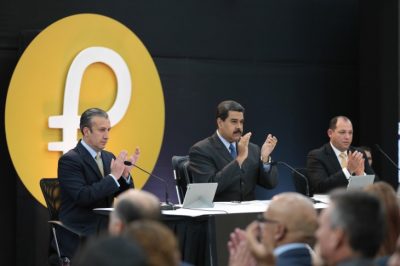Venezuela: Petro Sales Exceed $1 Billion in Just Two Days
Venezuelan President Maduro said almost one million people have visited the Petro website since the currency’s launch two days ago.

Venezuelan President Nicolas Maduro said Thursday that his government has raised US$1 billion in the first two days of its “Petro” cryptocurrency sale.
“We already have offers and negotiations that exceed US$1 billion, in just two days, far exceed US$1 billion, here in the hand, cold and hard,” said Maduro in a brief speech on Facebook live.
Each day that passes “that will grow, that’s US$1 billion … that go directly to the resources of the Republic,” added the president.
The Venezuelan government issued the digital currency in response to the financial sanctions applied by the United States and European Union, which prevent its citizens from acquiring new debt from the oil nation and limited the movements of Caracas’ money in global banking.
Maduro said that in the first two days since the launch of the digital currency,
“292,000 Petro purchase option offers have been made, of which 36 percent have been made in dollars, 15 percent in euros, 18 percent in Ethereum, and 31 percent in Bitcoin.”
The cryptocurrency has generated interest in several countries, such as Colombia, China, Spain and Palestine after the Venezuelan government launched a private presale of 38.4 million Petros of the total 100 million released, which will extend until March 19.
“Just today 950,000 people entered the page to interconnect, download information from the Petro, which is a positive phenomenon, a monetary, political, economic, psychological phenomenon in the path of the new economy,” Maduro concluded.
The launch of the Petro was announced in December. It is regulated by the Superintendence of Cryptocurrencies and Related Activities, as well as the Blockchain Observatory.
Cryptocurrencies typically are not backed by any government or central banks, nor are they regulated. However, the U.S. Security and Exchanges Commission has been increasingly tracking digital currencies, classifying some tokens as securities, thus making them subject to oversight.

